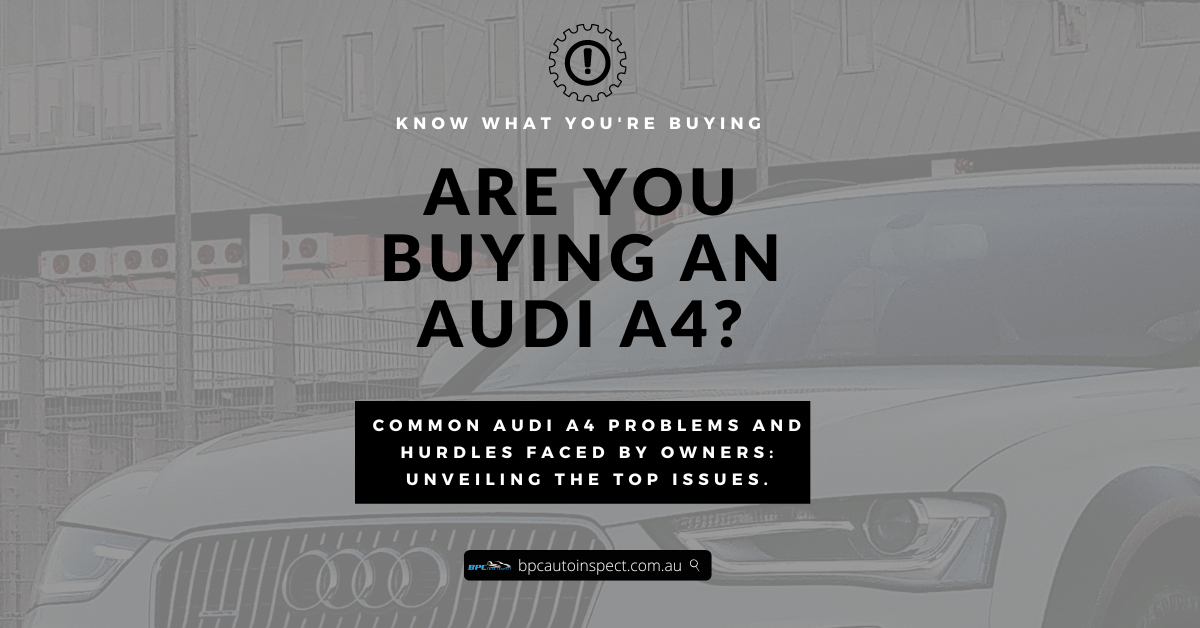Want to know the Audi A4 years to avoid so you can buy the best A4? From mechanical to electronic glitches, discover common problems.
Audi A4 Common Problems
Engine Problems
Audi A4 Excessive Engine Oil Consumption:
An issue that has plagued certain Audi A4 models, like the VW Amarok problem, is excessive engine oil consumption. This problem has been attributed primarily to design flaws in the piston rings and skirts.
Root Causes of Excessive Oil Consumption
- Piston Ring Design: The piston rings, responsible for sealing the combustion chamber and preventing oil from entering, are less effective than they should be in some A4 models. This can lead to oil being burned during combustion, resulting in excessive consumption.
- Piston Skirt Design: The piston skirts, the lower portion of the piston that slides within the cylinder, can also contribute to oil consumption. If the skirt is not designed or manufactured correctly, oil leaks past and into the combustion chamber.
- Faulty PCV (Positive Crankcase Ventilation) Valves: The PCV valve is a crucial component that regulates the flow of crankcase gases back into the intake manifold to be burned. If the PCV valve is faulty or becomes clogged, it can disrupt the proper ventilation of the crankcase, leading to increased pressure. This elevated pressure can force oil past the piston rings and into the combustion chamber, resulting in excessive oil consumption.
- Engine Oil Entering the Brake Servo Via the Vacum Lines: This can be caused by, a faulty vacuum hose, oil pressure or brake servo contamination.
These are some of the common causes of excessive oil consumption but of course, other factors can contribute to excessive oil consumption in Audi A4 models.
Affected Models and Years
While this issue has affected various Audi A4 models, it is particularly prevalent in certain model years and engine configurations. It’s essential to consult your vehicle’s specific documentation or a qualified mechanic to determine if your A4 is at risk.
Solutions and Recalls
Audi has acknowledged this problem and has implemented various solutions, including:
- Engine Software Updates: In some cases, software updates have been released to adjust engine parameters and reduce oil consumption.
- Hardware Modifications: In more severe cases, hardware modifications, such as replacing piston rings or pistons, may be necessary to address the issue.
- Recalls: Audi has issued recalls for affected vehicles to address the excessive oil consumption problem.
If you notice excessive oil consumption in your Audi A4, it’s crucial to have it inspected by a qualified mechanic. They can diagnose the specific cause and recommend appropriate solutions, such as repairs or potential recall eligibility.
Timing Chain Tensioner Problems:
The timing chain tensioner is responsible for keeping the timing chain in tension, and if it fails, it can cause the timing chain to jump, which can damage the engine. This problem is common in Audi A4 models with the 2.0-litre turbocharged engine. The tensioner can be replaced as a preventive measure.
Start-Stop Defects
Some Audi A4 models with start-stop technology have been reported to have problems with the start-stop system. These problems can range from the system not working to the system causing the engine to stall. The problems can be fixed by replacing the start-stop control module or by reprogramming the module.
Gearbox Problems
Shuddering or Jerking
This is a common problem with some Audi A4 models with manual transmissions. The problem is caused by a faulty synchronizer, which helps to engage the gears smoothly. The synchronizer can be replaced to fix the problem.
Clutch Problems
This is another common problem with some Audi A4 models with manual transmissions. The clutch can wear out over time, and when it does, it can cause the car to jerk or stall when shifting gears. The clutch can be replaced to fix the problem.
Audi A4 DSG Transmission
2008 to 2015 Audi A4 DSG (Direct Shift Gearbox) Transmission Problems
- Hard shifting: The transmission may shift harshly or abruptly when accelerating or decelerating.
- Slipping: The transmission may slip, which can cause the car to jerk or lurch.
- Erratic shifting: The transmission may shift erratically, meaning it may not shift gears smoothly or at the correct time.
Caused by Several Factors, Including
- Faulty mechatronics unit: The mechatronics unit is a computer that controls the transmission, and if it fails, it can cause problems, including hard shifting, slipping, and erratic shifting.
- Software problems: The software that controls the transmission can be buggy and leads to problems with shifting.
- Hardware problems: The mechanical components of the transmission can also fail. This leads to problems with shifting.
If you have an Audi A4 from 2008 to 2015 with a DSG transmission, be aware of the potential problems and have the transmission serviced regularly. If you experience any problems with the transmission, take the car to a qualified mechanic as soon as possible.
Tips to Avoid DSG Transmission Problems
- Service the transmission regularly: The transmission fluid should be changed every 40,000 miles or 2 years, whichever comes first.
- Avoid aggressive driving: Shifting gears too quickly or hard puts unnecessary stress on the transmission.
- Be aware of the signs of problems: If you notice any problems with the transmission, such as hard shifting, slipping, or erratic shifting, take the car to a qualified mechanic as soon as possible.
Other Common Problems
Airbag and Seat Belt Problems:
There are some reports of airbag and seat belt problems in some Audi A4 models. These problems can be caused by a manufacturing defect and can be fixed by replacing the airbag module or the seat belt assembly.
Suspension Problems:
Some Audi A4 models have been reported to have problems with the suspension. These problems can range from worn struts to leaking shocks. The problems can be fixed by replacing the worn or leaking parts.
How to Avoid Common Audi A4 Problems
Get Regular Maintenance:
This is the best way to prevent problems from occurring in the first place. Follow the manufacturer’s recommended maintenance schedule, and have your car serviced by a qualified mechanic.
Buying a Used Audi A4
You can follow my checklist for used car buying to learn how to inspect a used car including the service history when shopping for a used Audi A4 so you can avoid buying problems. Buying from a reputable Audi dealer can provide you with a warranty giving you that extra peace of mind. Whichever way you choose it’s still important to get an independent pre-purchase vehicle inspection before handing over your money to avoid buying a car with hidden mechanical problems or accident damage.
Audi A4 Years to Avoid
- 2008: This model year also had several engine problems, as well as problems with the transmission and the electrical system.
- 2009: This model year had the most complaints of any Audi A4 model year, with the majority of them related to the engine. The most common problem was excessive oil consumption, which can be an expensive repair cost.
- 2010: This model year had a few problems with the engine, as well as problems with the suspension and the brakes.
- 2011: This model year was also plagued by engine problems, including excessive oil consumption and timing chain tensioner failures. These problems can be very expensive to fix, and they can lead to major engine damage if they’re not addressed.
Here’s What They Say Over at Carlogos:
The worst model year for the Audi A4 was 2011. This model year of the Audi A4 experienced a variety of mechanical difficulties and failures, with the majority of them coming from the engine. The most prevalent complaint about the 2011 Audi A4 was that it was not at all fuel-efficient and routinely ate up gas. This may not be a life-threatening situation, but over time can be one of the more expensive.
carlogos
If you’re considering buying a used Audi A4, avoiding these model years is best. Other Audi A4 model years are more reliable, and they’re not that much more expensive.
Most Reliable Audi A4 Years
The 2012 Audi A4 is a good place to start your search. Here is a list of other model years:
- 2012: This model year fixed many of the problems found in the earlier model years.
- 2013: This model year continued the trend of improved reliability.
- 2014: This model year was the first year of the new B9 generation of the Audi A4, and it’s considered to be one of the most reliable Audi A4 models ever made.
Is the Audi A4 a Good Car?
It’s important to note that these problems are not widespread and may only affect a small percentage of vehicles. Overall, the Audi A4 is a reliable car, but be aware of these problems and take these steps to prevent them or fix them early on.
*Some links in this post are affiliate links, which means we may earn a commission at no extra cost to you. Please refer to our disclaimer for more info.




